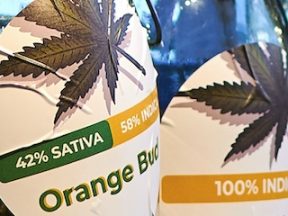Consumers are discovering the medicinal benefits of cannabis plants. Three college grads in Wisconsin saw the opportunity in 2018 when they launched Batch, a direct-to-consumer seller and custom manufacturer of products from CBD, the non-impairing marijuana and hemp extract.
Fast forward to 2023, and Milwaukee-based Batch produces CBD oils, gummies, and other products for itself and external brands.
I recently spoke with the three founders, all lifelong buddies, about launching the company, manufacturing products, acquiring customers, and more.
The entire audio of our conversation is embedded below. The transcript is edited for length and clarity.
Eric Bandholz: What the hell is Batch?
Dennis Mistrioty: Batch is a CBD company, mostly an ecommerce brand. We sell hemp-derived products (oils, gummies, topicals), THC items, and non-hemp goods (energy, gummies, hydration).
It is exclusively direct-to-consumer on the Batch-branded side. But we’re also a vertically integrated manufacturer. We have our own hemp farm. We extract oils for our hemp products and do the formulation, bottling, and fulfillment. We do that for Batch the brand. We’re also a contract manufacturer for other CBD companies and cosmetic skincare and topical-product brands.
Andy Gould: We were roommates in college and started Batch in 2018 as a manufacturing business. Our idea was to make products for external brands because CBD took the country by storm at the time.
Griffin and I had a background in chemical engineering. We thought we had a good idea of how to get a process up and running. Dennis, the business and marketing-minded person, would find the customers, and Griff and I would set up the operation. Those roles still hold. Griffin and I are on the operations, product development, analytical, and technical side. Dennis does branding, but the three of us dip our toes in every facet of the company.
Griffin Lynch: Everyone says not to start a business with your friends. But we’re very good friends, and it helps us because we trust each other. There’s a high level of accountability, almost to the point where you want to work extra hard not to let them down. I don’t see anyone taking advantage of this friendship. If anything, it’s the opposite.
Bandholz: Manufacturing sounds difficult.
Lynch: Our number two guy, Nick, handles all sorts of manufacturing tasks. You want manufacturing to be running in the background and not have to worry about it. But at the end of the day, that’s not what manufacturing is. It’s similar to ecommerce. Stuff breaks, and you have to fix it. That’s where our technical skills come into play. It is a headache that you don’t want to deal with, but at the same time, it is a great business. It gives us these great relationships, and I don’t think we would ever neglect that in any way.
Gould: It’s logistically complex. We have around 2,000 parts comprising all the ingredients and packaging components. For the first year or two, we were imbeciles, trying to keep track of everything in Google Sheets. We are bootstrapped, so we had to work and figure it out. Griff and I knew how to set up a manufacturing process but didn’t know how to scale one. We just dug our claws in. There are various software and tricks we had to learn.
Mistrioty: We partner with strong brands we want to work with. Because of that, we can give white glove treatment and provide those clients with anything they need, more or less. It makes doing business smooth and fun because we don’t like making money by angering folks. Having healthy relationships where customers are happy is more manageable, and we can passionately work on a project despite all these SKUs.
Gould: We’re not making products for brands doing $100 million a year. We specialize in 500 to 5,000 unit runs. So small runs. And that gives us a lot of nimbleness in manufacturing. We can handle 10 orders of 1,000 units better than one at 100,000. We’ve designed our manufacturing business to make a ton of SKUs for a ton of brands. That turns out to be very helpful when 20 brands order at once.
Bandholz: Walk us through your customer acquisition strategy.
Mistrioty: We discovered our acquisition avenue from some of the brands we were manufacturing for. In 2018, before we knew the game, we thought they were superheroes because they were all over these lists when you typed in “best CBD oil” on Google. We thought, “Wow, we’re manufacturing three of the best CBD oils in the world right now.” We didn’t know what search engine optimization meant, let alone affiliate marketing.
By observing what they did, we started to learn a lot about SEO. Now, we have partners that occupy the first page of Google for every relevant keyword — from “the best CBD gummies” to “the difference between hemp and marijuana.” Many of these are informational keywords, not transactional, but we want to be present anywhere a potential CBD customer could look.
That’s where SEO and affiliate combine. You can do that yourself with our own site, which we do, and we show up for less competitive keywords. But in an industry that is all forced to do SEO and affiliate — only recently has Google accepted CBD ads — it’s not easy to show up number one on Google for a keyword.
The alternative is to leverage the authority of various publications and be featured on their content with an affiliate structure. That’s where most of our acquisition comes from. It’s an excellent acquisition strategy because most customers know what they want and what CBD is, even if they don’t know everything about it. We have other types of affiliates, too, but they are more like traditional advertising.
Gould: We view the affiliate-in-SEO strategy as a digital real estate game. We buy digital real estate on Forbes, Healthline, Discover Magazine, and more. As folks search the internet for CBD-related info, they see us everywhere. It’s super hard at the start. You’re only going to appear in one or two places. Nobody’s going to recognize you. It took us two to three years to build up our strategy. Suppose you’re searching for “hemp versus marijuana,” “CBD versus CBG,” or anything related to CBD and THC. For those searches, an article or a link with our name will likely occupy two of the top three links on Google.
Bandholz: Where can listeners buy some gummies?
Lynch: Go to HelloBatch.com. We’re also on Instagram. If you’re in the Milwaukee area, feel free to stop by. We give tours of our facility regularly.





